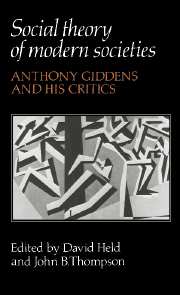Book contents
- Frontmatter
- Contents
- List of contributors
- List of abbreviations
- Editors' introduction
- 1 Social theory as critique
- 2 Hermeneutics and modern social theory
- 3 The theory of structuration
- 4 Models of historical trajectory: an assessment of Giddens's critique of Marxism
- 5 Capitalism, nation-states and surveillance
- 6 War and the nation-state in social theory
- 7 Only half the story: some blinkering effects of ‘malestream’ sociology
- 8 Citizenship and autonomy
- 9 Presences and absences: time–space relations and structuration theory
- 10 Space, urbanism and the created environment
- 11 On the (ir)relevance of structuration theory to empirical research
- 12 A reply to my critics
- Select bibliography
- Index
10 - Space, urbanism and the created environment
Published online by Cambridge University Press: 24 November 2009
- Frontmatter
- Contents
- List of contributors
- List of abbreviations
- Editors' introduction
- 1 Social theory as critique
- 2 Hermeneutics and modern social theory
- 3 The theory of structuration
- 4 Models of historical trajectory: an assessment of Giddens's critique of Marxism
- 5 Capitalism, nation-states and surveillance
- 6 War and the nation-state in social theory
- 7 Only half the story: some blinkering effects of ‘malestream’ sociology
- 8 Citizenship and autonomy
- 9 Presences and absences: time–space relations and structuration theory
- 10 Space, urbanism and the created environment
- 11 On the (ir)relevance of structuration theory to empirical research
- 12 A reply to my critics
- Select bibliography
- Index
Summary
In this chapter I consider the significance which Giddens attributes to space in the organization of social life. The first part consists of a relatively detailed exposition of Giddens's treatment of the concepts of space, the city, urbanism and the created environment. These concepts are familiar to those working in areas such as urban sociology and human geography, but the significance of Giddens's analysis of them is that he seeks to place them at the heart of sociology as a whole. The first part of this chapter therefore tries to clarify why he believes these concepts are so crucial. I then follow this exposition in the second part with a critical evaluation, by means of which I conclude that his work does not establish the case for the centrality of spatial concepts to sociological theory.
Space and urbanism in Giddens's social theory
Giddens's concern with spatial organization as in some way significant as a factor entering into social organization begins with his analysis of class relations in The Class Structure of the Advanced Societies. In that work he addressed the question of how variations in people's market situations came to form the basis of distinct social groupings, and hence of how social classes came to be ‘structured’. He suggested that class structuration was accomplished in two ways – first through a process of ‘mediate structuration’, in which different groups sought to close off entry to others, and second, through a process of ‘proximate structuration’, in which social differences were reaffirmed by maintaining physical and social separateness.
- Type
- Chapter
- Information
- Social Theory of Modern SocietiesAnthony Giddens and his Critics, pp. 215 - 234Publisher: Cambridge University PressPrint publication year: 1989
- 16
- Cited by



